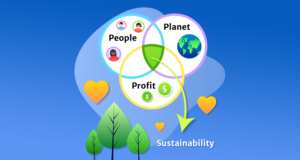Navigating the Green Revolution: A Guide to Sustainable Production
Blog Categories:
Published:
December 28, 2023
Reading Time:
6 minutes

In a world where the ecological clock is ticking louder than ever, industries are rethinking their production processes to align with sustainability goals.
This article serves as a guide to navigating the landscape of sustainable production, particularly in the manufacturing sector. As environmental concerns become integral to public consciousness, the importance of adopting sustainable production practices cannot be overstated.
This exploration aims to unravel the theories, challenges, and transformative impact of sustainable production in reshaping the manufacturing industry toward a greener and more environmentally conscious future.
This article serves as a guide to navigating the landscape of sustainable production, particularly in the manufacturing sector. As environmental concerns become integral to public consciousness, the importance of adopting sustainable production practices cannot be overstated.
This exploration aims to unravel the theories, challenges, and transformative impact of sustainable production in reshaping the manufacturing industry toward a greener and more environmentally conscious future.
Sustainable Production: A Paradigm Shift in Manufacturing Philosophy
In the contemporary manufacturing landscape, the term "sustainable production" echoes far beyond being a mere buzzword. It encapsulates a profound paradigm shift, fundamentally altering the traditional approach to industrial processes. This section aims to illuminate the essence of sustainable production, moving beyond superficial definitions to explore its transformative principles.
Sustainability Unveiled: Sustainable production is, at its core, a commitment to longevity — a commitment to the environment, society, and the economic health of enterprises. At the foundation lies the practice of minimizing waste, a departure from the conventional 'take, make, dispose' model. Industries are now transitioning towards circular economies, where resources are conserved, reused, and recycled in a closed-loop system.
Optimizing Resource Use: Beyond waste reduction, sustainable production entails meticulously optimizing resource use. It's an art of efficiency, where each material and energy input is carefully scrutinized.
There are multiple strategies companies can employ to ensure that resources are utilized judiciously, minimizing not only environmental impact but also operational costs.
The Clean Energy Imperative: An integral facet of sustainable production is adopting cleaner energy sources. This shift is pivotal as traditional manufacturing often relies heavily on fossil fuels. The various clean energy alternatives embraced by forward-thinking companies, from solar and wind to innovative solutions like hydrogen power, mean businesses are redefining their energy landscapes.
Sustainability Unveiled: Sustainable production is, at its core, a commitment to longevity — a commitment to the environment, society, and the economic health of enterprises. At the foundation lies the practice of minimizing waste, a departure from the conventional 'take, make, dispose' model. Industries are now transitioning towards circular economies, where resources are conserved, reused, and recycled in a closed-loop system.
Optimizing Resource Use: Beyond waste reduction, sustainable production entails meticulously optimizing resource use. It's an art of efficiency, where each material and energy input is carefully scrutinized.
There are multiple strategies companies can employ to ensure that resources are utilized judiciously, minimizing not only environmental impact but also operational costs.
The Clean Energy Imperative: An integral facet of sustainable production is adopting cleaner energy sources. This shift is pivotal as traditional manufacturing often relies heavily on fossil fuels. The various clean energy alternatives embraced by forward-thinking companies, from solar and wind to innovative solutions like hydrogen power, mean businesses are redefining their energy landscapes.
KEY TAKEAWAYS
- Business Necessity: In a world where the ecological clock is ticking louder than ever, industries are rethinking their production processes to align with sustainability goals. As environmental concerns become integral to public consciousness, the importance of adopting sustainable production practices cannot be overstated.
- Core Principle: At its core, it is a commitment to longevity — a commitment to the environment, society, and the economic health of enterprises. The foundation lies in the practice of minimizing waste, a departure from the conventional 'take, make, dispose' model.
- Triple Bottom Line: The heart of sustainable production lies in embracing the triple bottom line The three dimensions of this philosophy are: economic, environmental, and social. By balancing these considerations, companies not only mitigate their environmental footprint but also enhance their long-term viability and societal impact.
- Consumer Paradigm Shift: The modern consumer is not merely a spectator but an active participant in the sustainability narrative. This shift in consumer preferences, where eco-conscious choices are not just appreciated but expected, means companies aligning with sustainable production have an advantage.
Triple Bottom Line: Balancing the Scales
The heart of sustainable production lies in embracing the triple bottom line — a philosophy that transcends the singular pursuit of profit. The three dimensions of this philosophy are economic, environmental, and social.
By balancing these considerations, companies mitigate their environmental footprint and enhance their long-term viability and societal impact.

Economic Efficiency: Economic considerations delve into the financial sustainability of a company. Sustainable production is not just an ethical choice but a strategic one, where cost savings emerge from streamlined processes, resource efficiency, and adherence to stringent environmental regulations.
This subsection illuminates the economic benefits of companies aligning their bottom line with sustainability goals.
Environmental Stewardship: Environmental considerations emphasize the preservation of ecosystems and biodiversity. From reducing carbon emissions to minimizing water usage, sustainable production practices are analyzed in the context of their broader environmental impact.
This underscores the role of industries as stewards of the planet, contributing to its health rather than depleting its resources.
Social Responsibility: Lastly, the social dimension of the triple bottom line underscores the responsibility companies bear toward society. Sustainable production involves ethical labor practices, community engagement, and contributing positively to the regions in which businesses operate.
This portion emphasizes that sustainable enterprises are economically and environmentally conscious and socially responsible.

Regulatory Landscape: Governments across the globe increasingly recognize the imperative to curb environmental degradation. Newer, more stringent environmental regulations are reshaping the manufacturing landscape, compelling industries to adopt sustainable practices or face legal repercussions.
From emissions standards to waste disposal regulations, how companies navigate this evolving compliance landscape is crucial.
Consumer Paradigm Shift: Beyond regulatory pressures, consumer expectations are steering the trajectory of the manufacturing industry. The modern consumer is not merely a spectator but an active participant in the sustainability narrative.
This paradigm shift in consumer preferences, where eco-conscious choices are appreciated and expected, means companies aligning with sustainable production aren’t merely meeting ethical benchmarks; they are tapping into a consumer base that values environmental responsibility.
Cost Savings and Operational Efficiency: The economic benefits of sustainable production are not confined to strategic foresight; they translate into tangible cost savings. Companies can enhance their operational efficiency by minimizing waste, optimizing resource use, and adopting clean energy.
There are various avenues through which sustainable practices lead to financial advantages and create a compelling business case for their adoption.
Enhanced Brand Reputation: The impact of sustainable production isn’t confined to profit margins; it resonates profoundly in the realm of brand reputation. Consumers are increasingly associating brand value with environmental responsibility.
Businesses that embrace sustainability meet consumer expectations and carve a distinct niche in the market, so a commitment to sustainable production becomes a powerful branding tool, fostering goodwill and loyalty among eco-conscious consumers.
Tesla's commitment extends to using recycled materials in its vehicles, reducing environmental impact. The company's success showcases that sustainable production practices align with ethical considerations and position the business as a leader in a rapidly changing market.
Embracing Sustainable Consumer Goods: Unilever, a global consumer goods giant, has made substantial strides in sustainable production. The company's Sustainable Living Plan focuses on reducing environmental impact throughout its supply chain.
Unilever has committed to sustainably sourcing 100% of its agricultural raw materials and aims to make its packaging fully reusable, recyclable, or compostable by 2025. By embedding sustainable practices into its operations, Unilever enhances its brand image and responds to the growing consumer demand for eco-friendly products.
A Trailblazer in Sustainable Apparel: Patagonia, an outdoor clothing and gear company, is renowned for its commitment to sustainable production. The company emphasizes using recycled and responsibly sourced materials in its products.
Patagonia's "Worn Wear" initiative notably promotes repairing, reusing, and reclaiming its clothing, encouraging a circular economy model. By challenging the conventional fast-fashion paradigm, Patagonia demonstrates that sustainable production is feasible and can drive business success, fostering customer loyalty and brand authenticity.
By balancing these considerations, companies mitigate their environmental footprint and enhance their long-term viability and societal impact.

Economic Efficiency: Economic considerations delve into the financial sustainability of a company. Sustainable production is not just an ethical choice but a strategic one, where cost savings emerge from streamlined processes, resource efficiency, and adherence to stringent environmental regulations.
This subsection illuminates the economic benefits of companies aligning their bottom line with sustainability goals.
Environmental Stewardship: Environmental considerations emphasize the preservation of ecosystems and biodiversity. From reducing carbon emissions to minimizing water usage, sustainable production practices are analyzed in the context of their broader environmental impact.
This underscores the role of industries as stewards of the planet, contributing to its health rather than depleting its resources.
Social Responsibility: Lastly, the social dimension of the triple bottom line underscores the responsibility companies bear toward society. Sustainable production involves ethical labor practices, community engagement, and contributing positively to the regions in which businesses operate.
This portion emphasizes that sustainable enterprises are economically and environmentally conscious and socially responsible.
Impact of Sustainable Production on the Manufacturing Landscape
In the ever-evolving terrain of manufacturing, the theory of sustainable production has emerged as a transformative force. This section delves into the multifaceted impact that sustainable practices imprint on the industry.
Regulatory Landscape: Governments across the globe increasingly recognize the imperative to curb environmental degradation. Newer, more stringent environmental regulations are reshaping the manufacturing landscape, compelling industries to adopt sustainable practices or face legal repercussions.
From emissions standards to waste disposal regulations, how companies navigate this evolving compliance landscape is crucial.
Consumer Paradigm Shift: Beyond regulatory pressures, consumer expectations are steering the trajectory of the manufacturing industry. The modern consumer is not merely a spectator but an active participant in the sustainability narrative.
This paradigm shift in consumer preferences, where eco-conscious choices are appreciated and expected, means companies aligning with sustainable production aren’t merely meeting ethical benchmarks; they are tapping into a consumer base that values environmental responsibility.
Cost Savings and Operational Efficiency: The economic benefits of sustainable production are not confined to strategic foresight; they translate into tangible cost savings. Companies can enhance their operational efficiency by minimizing waste, optimizing resource use, and adopting clean energy.
There are various avenues through which sustainable practices lead to financial advantages and create a compelling business case for their adoption.
Enhanced Brand Reputation: The impact of sustainable production isn’t confined to profit margins; it resonates profoundly in the realm of brand reputation. Consumers are increasingly associating brand value with environmental responsibility.
Businesses that embrace sustainability meet consumer expectations and carve a distinct niche in the market, so a commitment to sustainable production becomes a powerful branding tool, fostering goodwill and loyalty among eco-conscious consumers.
Showcasing Sustainable Production in Action: Real-world Case Studies
Leading the Charge in Sustainable Automotive Production: Tesla, the electric vehicle pioneer, exemplifies sustainable production in the automotive industry. Beyond producing zero-emission electric cars, Tesla's Gigafactories prioritize sustainability. These facilities integrate renewable energy sources, such as solar and wind, to power manufacturing processes.Tesla's commitment extends to using recycled materials in its vehicles, reducing environmental impact. The company's success showcases that sustainable production practices align with ethical considerations and position the business as a leader in a rapidly changing market.
Embracing Sustainable Consumer Goods: Unilever, a global consumer goods giant, has made substantial strides in sustainable production. The company's Sustainable Living Plan focuses on reducing environmental impact throughout its supply chain.
Unilever has committed to sustainably sourcing 100% of its agricultural raw materials and aims to make its packaging fully reusable, recyclable, or compostable by 2025. By embedding sustainable practices into its operations, Unilever enhances its brand image and responds to the growing consumer demand for eco-friendly products.
A Trailblazer in Sustainable Apparel: Patagonia, an outdoor clothing and gear company, is renowned for its commitment to sustainable production. The company emphasizes using recycled and responsibly sourced materials in its products.
Patagonia's "Worn Wear" initiative notably promotes repairing, reusing, and reclaiming its clothing, encouraging a circular economy model. By challenging the conventional fast-fashion paradigm, Patagonia demonstrates that sustainable production is feasible and can drive business success, fostering customer loyalty and brand authenticity.
Navigating Sustainable Production Transformation
Embarking on the path of sustainable production transformation demands expertise, and Consultport can be an indispensable guide in this journey. Our network of seasoned experts spans industries, offering tailored insights to align your production processes with sustainability goals and bringing a wealth of experience in implementing sustainable practices, from minimizing waste to optimizing resource usage.
From identifying eco-friendly materials to recommending energy-efficient technologies, Consultport's consultants are at the forefront of the sustainable production frontier, guiding your company toward a greener and more environmentally responsible future.
Consultport's approach is not just about theoretical strategies; it's about actionable solutions. Contact us today and let our experts collaborate with your team, ensuring a seamless integration of sustainable production principles into your operations.
From identifying eco-friendly materials to recommending energy-efficient technologies, Consultport's consultants are at the forefront of the sustainable production frontier, guiding your company toward a greener and more environmentally responsible future.
Consultport's approach is not just about theoretical strategies; it's about actionable solutions. Contact us today and let our experts collaborate with your team, ensuring a seamless integration of sustainable production principles into your operations.
Share This Story, Choose Your Platform!



